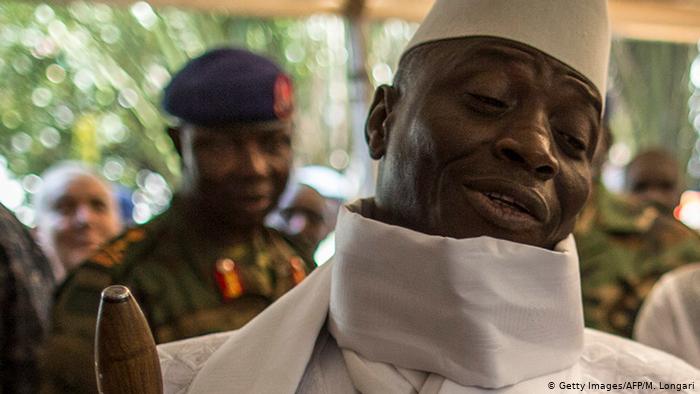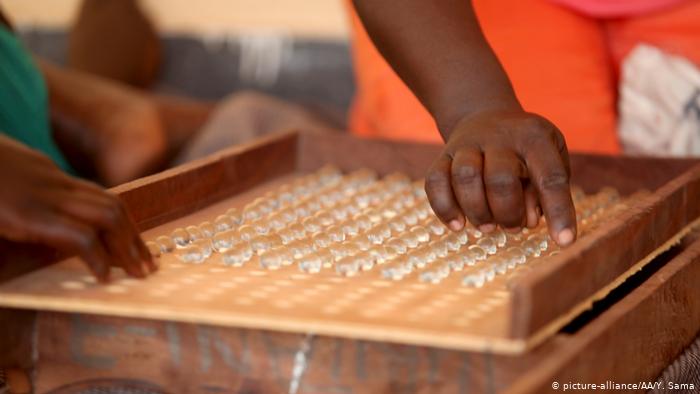
Audio By Carbonatix
Voting in Gambia is unlike anywhere else. Instead of casting a paper ballot, Gambians cast a marble instead. But plans to do away with the traditional practice have sparked a heated debate in the country.
When Gambians step into a voting booth, they don't put a cross on a piece of paper. Instead, they stand before multi-colored drums, deciding which one they will throw their glass marble into.
For easy identification, the drums are painted different colors for different candidates. Casting the marble sets off a little bell, to discourage people from trying to smuggle in extra marbles and vote more than once.
A dictator ousted with marbles
The system was introduced in the 1960's to ensure that everyone had their say in a country with very high illiteracy rates.
The iconic glass marbles have since become a curiosity for the rest of the world. But the system proved to work well for Gambia. It was good enough to vote out long-time dictator Yahya Jammeh in 2016, despite his best efforts to rig the elections. While he tried to resist his ousting, he ultimately bowed to the weight of the marbles and conceded defeat to current President Adama Barrow.

However, according to the will of Gambia's Independent Electoral Commission (IEC), the 2016 election would be the last time that a head of state is to be voted in or out of office through marbles. At the next presidential election, scheduled for the end of 2021, Gambians will lose their marbles and start using paper ballots instead.
A logistical nightmare
So why is Gambia doing away with the marbles now? IEC Chairman Alieu Momor Njai told DW that the electoral system has simply become too complicated for the marbles to handle.
"We used to have only two or three contestants," he said. "But today sixteen parties have registered candidates and we also have independent candidates."
This, Njai added, makes it nigh impossible to place dozens of different-colored drums in every polling station. It would be a "nightmare and a headache to transport them," he said "After the elections, where will you keep them?"
Change divides Gambians
Not all Gambians are convinced that paper ballots are a better option. A quick — albeit informal — survey on the streets of Banjul showed that citizens have mixed feelings on the matter.
"People might not understand how things are done," one resident told DW. "Let us stick to the method that we know since that method is transparent."
But not everyone agrees. "I think Gambia doing away with the marble system of voting is long overdue," said another Banjul local.
Some Gambians are concerned there won't be enough time before the next election to properly switch to a new system.
But most of all, those who are against the change are worried about how it will impact the voting process, with most people unfamiliar with paper ballots and the risks of vote-rigging.
'Not the dumbest country'
IEC chairman Njai dismisses these qualms: "We are not the dumbest country in the world for our people not to be able to use paper ballots like the whole world is using," he said.
The latest available data from the United Nations Educational, Scientific and Cultural Organization (UNESCO), shows that in 2015, the literacy rate in Gambia among the population aged 15 and above was 51%. On average, more than 60% of the West African population can read and write.
Latest Stories
-
Ghana is rising again – Mahama declares
5 hours -
Firefighters subdue blaze at Accra’s Tudu, officials warn of busy fire season ahead
5 hours -
New Year’s Luv FM Family Party in the park ends in grand style at Rattray park
5 hours -
Mahama targets digital schools, universal healthcare, and food self-sufficiency in 2026
5 hours -
Ghana’s global image boosted by our world-acclaimed reset agenda – Mahama
6 hours -
Full text: Mahama’s New Year message to the nation
6 hours -
The foundation is laid; now we accelerate and expand in 2026 – Mahama
6 hours -
There is no NPP, CPP nor NDC Ghana, only one Ghana – Mahama
6 hours -
Eduwatch praises education financing gains but warns delays, teacher gaps could derail reforms
6 hours -
Kusaal Wikimedians take local language online in 14-day digital campaign
7 hours -
Stop interfering in each other’s roles – Bole-Bamboi MP appeals to traditional rulers for peace
7 hours -
Playback: President Mahama addresses the nation in New Year message
8 hours -
Industrial and Commercial Workers’ Union call for strong work ethics, economic participation in 2026 new year message
10 hours -
Crossover Joy: Churches in Ghana welcome 2026 with fire and faith
10 hours -
Traffic chaos on Accra–Kumasi Highway leaves hundreds stranded as diversions gridlock
10 hours

